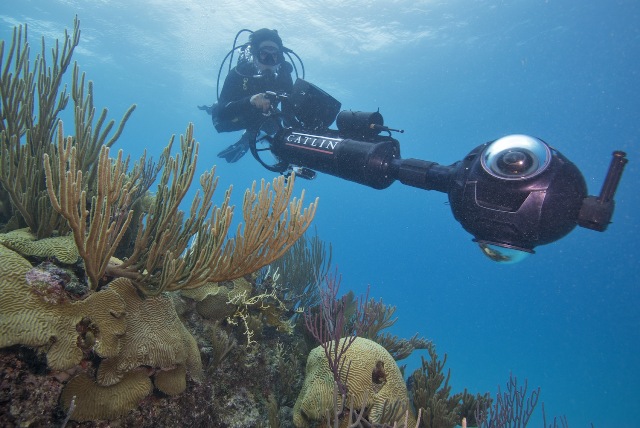Nature Foundation Assists in Caribbean-wide Coral Reef Study

An international coral reef research project, sponsored by international insurer Catlin Group Limited, was just in St. Maarten to assess the state of coral reefs over larger scales and in more precise detail than ever before possible. The Catlin Seaview Survey used a unique underwater scooter-assisted SVII camera system to conduct reef surveys within the Natural Reserve of Saint Martin and the Man of War Shoal Marine Park assisted by Nature Foundation staff.
Caption: Dr. Manuel Gonzalez-Rivero with the unique SVII camera system
Led by Dr. Manuel Gonzalez-Rivero from the University of Queensland in Australia, the project will establish a vital scientific baseline to study the potential factors driving change in the health of global coral reefs. Working closely with the Dutch Caribbean Nature Alliance, the Nature Foundation of St. Maarten and Réserve Naturelle Nationale de Saint-Martin, the Catlin Seaview Survey will use the data collected to provide informed scientific advice to local reef conservation agencies and management authorities.
Caribbean reefs have, over the last fifty years, been devastated by coastal development, overfishing and pollution. 80% of corals in the Caribbean have disappeared and reefs are also threatened by invasive species, climate change and ocean acidification. Coral reefs are acutely sensitive to environmental change; they are a vital gauge for monitoring the current and future impacts of human activities. With guidance from local researchers, NGOs and government agencies, the Catlin Seaview Survey surveyed key local reef sites and captured the current condition of the reef.
This pioneering scientific project uses cameras mounted on custom-designed diver propulsion vehicles (underwater scooters) to cover large stretches of reef. Underwater scooters allow a dramatic increase in the amount of reef that can be surveyed and in the level of accuracy in detecting the health of the coral ecosystem.
The data is captured by three digital SLR cameras positioned at angles to record unique 360° panoramic images. The high-definition pictures are stitched together and tagged with accurate GPS coordinates. This will facilitate a solid and comparable baseline of information, allowing for a comparison of reef health over time.
St. Maarten completes a year-long Caribbean campaign for the Catlin Seaview Survey. Throughout this year, the project has visited more than 13 Caribbean countries (including Bonaire, Curaçao and St. Eustatius) to create a comprehensive and standardized, region-wide survey. By studying the state of these reefs, the Catlin Seaview Survey aims to provide insights into the future prospects for coral reefs in other regions of the world.
The scientific data collected by the Catlin Seaview Survey will be available to all in a free online research tool called the Catlin Global Reef Record (www.globalreefrecord.org). The tool aims to encourage global collaboration between scientists, local and international management authorities and the general public.
"The Catlin Global Reef Record serves as an analytical tool that scientists and reef managers around the world now have at their fingertips," said Dr Gonzalez-Rivero. Images in the record are scanned for coral species and combined with regional coral bleaching data to allow for advanced analysis of worldwide reef health.
The data is important for the future conservation and management of coral reefs both in the Caribbean and worldwide.

